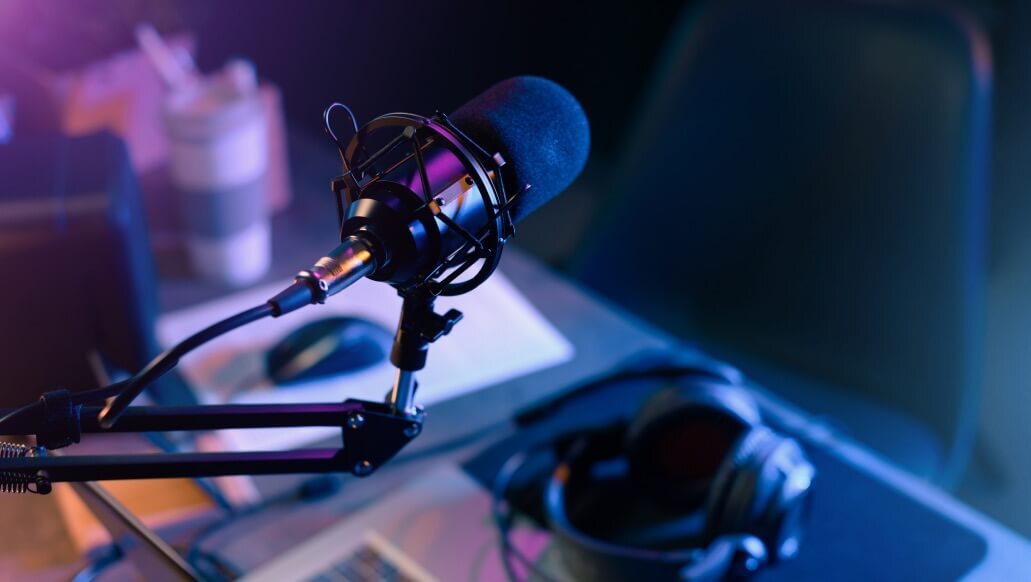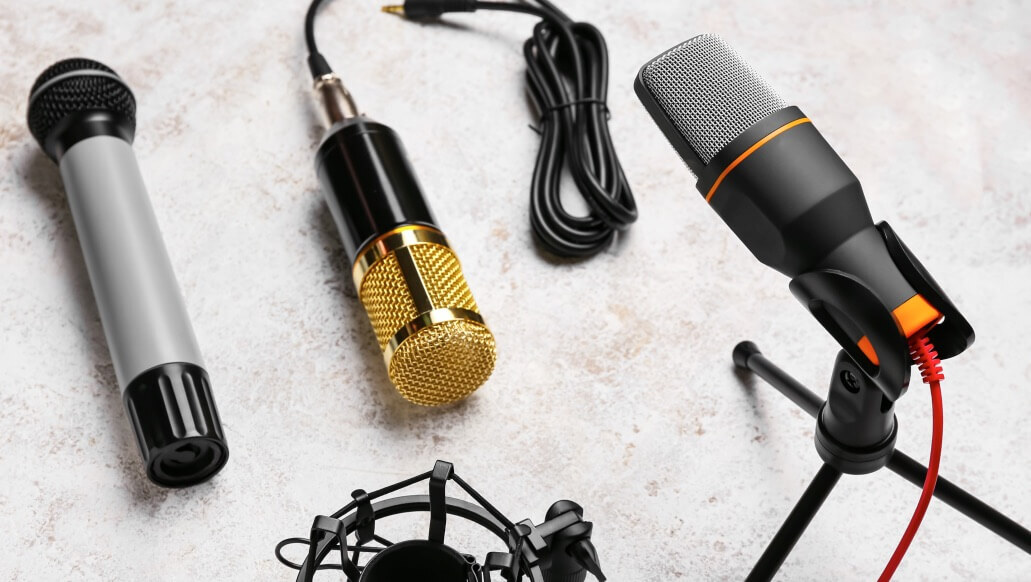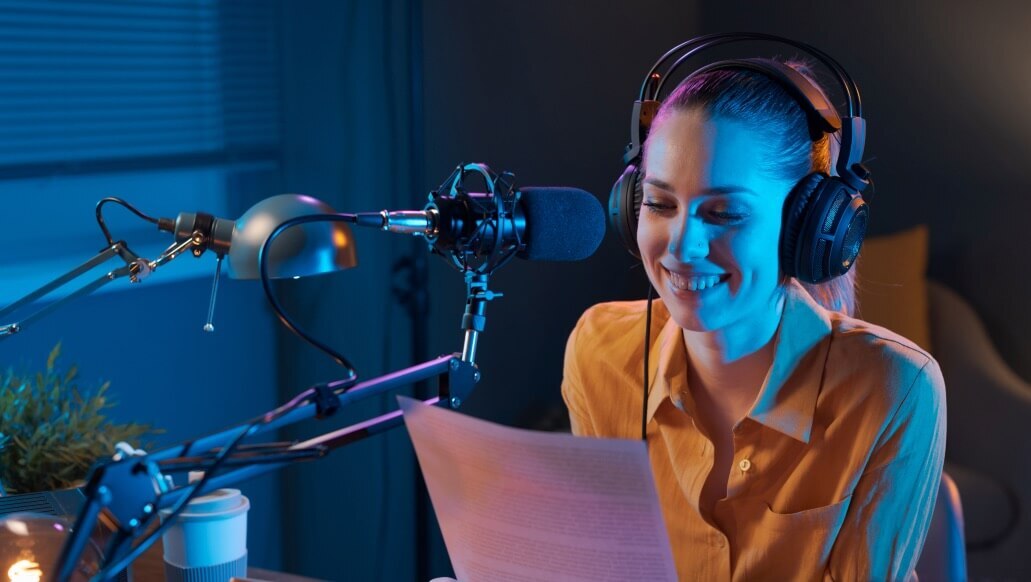A podcaster is only as strong as his microphone. Ok, this may not be totally true. But the microphone you use to host your podcast is very–very–important. Besides your actual voice, this piece of equipment is the most important tool to help give your audience an enjoyable audio experience and keep them tuned in to your show. So if you want to learn more about the best podcast microphones in 2022, you’ve come to the right place. We’re going to go over some of our personal favorites for microphones that you can use for podcasting–without breaking the bank.
Best Podcast Microphones on a Budget 2022
Top microphones for podcasting:
Why do they matter?
First thing’s first: Why does the microphone you use for podcasting matter so much? When you’re podcasting, your audience can’t see you. The only method you have to get your thoughts across to your audience is sound. And even if your audience is super interested in the topic you’re discussing, it’s very likely that they’ll leave your show if the sound is muffled or if there’s annoying background noise. The quality of your audio should ultimately make your podcast episode easy, relaxing, and entertaining for your audience to listen to. Anything less risks causing distractions and will take away from the content that you’re trying to deliver.
At the end of the day, the quality of your sound is a reflection of the overall quality of your show. Ensuring top-notch audio shows the audience that you’re professional and that you actually care about their listening experience.

How to choose a podcast microphone
Now that you know why your microphone matters, how do you know what to look for in a good microphone? Here are a few must-haves to look out for:
Pop filter:
That annoying “popping” sound when you say your “p” words can literally be the difference between sounding like a professional podcaster and an amateur. Some microphones come with an internal pop filter while others require external pop filters, which, as the name suggests, helps reduce this sound. Either way, we highly recommend using them when recording.
Shock mount:
Think of the shock absorber that a bike has. Even if you hit a bump in the road, the shock absorber helps make the ride an overall smoother experience. Well, the same goes for a shock mount with a microphone. This tool greatly reduces the low frequencies that the microphone picks up when you touch the table or your phone vibrates, for example.
Polar pattern:
A microphone’s polar pattern gives you valuable information about the microphone’s sensitivity to sound, based on its directivity. A cardioid polar pattern is generally the best solution when it comes to choosing a podcast microphone since it effectively rejects the sounds and reflections coming from its rear (fan noise, vibrations, or other guest speakers).
Background noise reduction:
Consider microphones that are less sensitive to sounds that may come from noise in the room or outside. This may require you to keep your mouth closer to the microphone, but hey, better than picking up doors slamming in the house or the car beeping outside, right?
What are the best podcast microphones?
And now the moment you’ve been waiting for! Here’s our roundup of some of the top podcast microphones in the game and why we love them:
1. Shure SM58
First up, we have the ol’ faithful Shure SM58. Popular among singers, this classic stage microphone is a very used piece of equipment that’s just as effective for recording podcasts. This microphone is simple, durable, and reliable to give you the best quality sound for your show.
2. Rode NT1 condenser microphone
This large-diaphragm cardioid condenser microphone boasts a flat frequency response with the lowest self-noise. In other words, ultra-low noise. It also includes a shock mount, a pop filter, and a dust cover. The Rode NT1 condenser microphone is a great option for podcasting, as well as singing. Keep in mind that, like all condenser microphones, this one calls for phantom power to operate. So just be sure that this is something your audio interface can provide.

3. Shure SM57
Beloved by podcasters, sound engineers, and musicians, the Shure SM57 is by and large the most dynamic microphone of all time. This microphone is built to last and is often used for the stage. Also, fun fact, you don’t even have to worry about a shock mount when recording your podcast! Just do your thing and this wonderful piece of equipment will take care of the rest.
4. Lewitt LCT 240 PRO
For all you newbie podcasters in the room, this microphone is for you. Used by musicians, singers, and content creators alike, the Lewitt LCT 240 PRO is a fantastic first condenser that offers great quality at a great price.

5. Shure SM7B
Last but not least, if you really want to take your podcasting to the next level, the Shure SM7B microphone is it. While it may be a bit more on the expensive side, the purified, round, and smooth quality it delivers is well worth it. With a wide-range frequency response, bass roll-off and mid-range control, and internal air suspension shock isolation, you’re sure to give your podcast a competitive edge with this microphone.
Tips to get the most out of your podcasting microphone
Once you’ve chosen the microphone that works for you, there are a few pro tips you can keep in mind to knock your sound quality out of the park.
- Choose your space wisely. Aim for a small, quiet space to avoid interruptions and any echoes. It’s also smart to fill your space with pillows, a carpet, or any other items that will help absorb any muffled, unwanted sounds.
- Mind the gap between your mouth and the mic. You should keep about 6 to 12 inches between you and your equipment– and make sure that your microphone is set at the same height as your mouth so you’re comfortable.
- Pay attention to your breathing. Sometimes microphones can pick up on your breathing and make it sound like a gust of wind just rolled in. To prevent this, try taking smaller breaths or just back away from your microphone when you need to inhale and exhale. Trust us, this will save you precious editing time later.
- Mute yourself when you’re not speaking. This will help avoid unwanted noise and, if you have a guest on your show, it will pick up their microphone easier.
- Try to sit still. We know it’s easy to get antsy or fidgety when sitting for a while, so you may want to consider taking breaks while recording. But definitely try to avoid too much movement or touching the table or else these sounds could sneak their way into your recording.
For more tips on how to start a podcast, check out our article here with tips from a professional podcast host.
Ready, Set, Start Podcasting!
There you have it: The best podcast microphones to use for superior sound quality at a reasonable price. Once you have your equipment, all that’s left is a killer idea for your show–and to have fun. Yes, there are definitely a lot of things to keep in mind and a good amount of planning that goes into running your own podcast. But try not to overthink it. At the end of the day, it’s about having fun and entertaining your listeners.